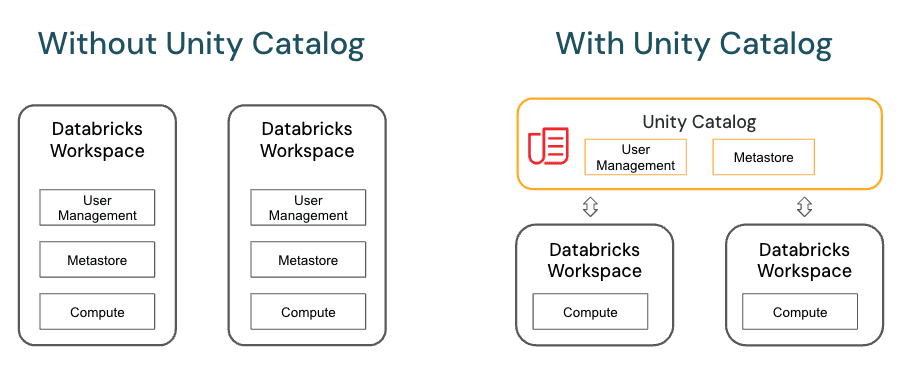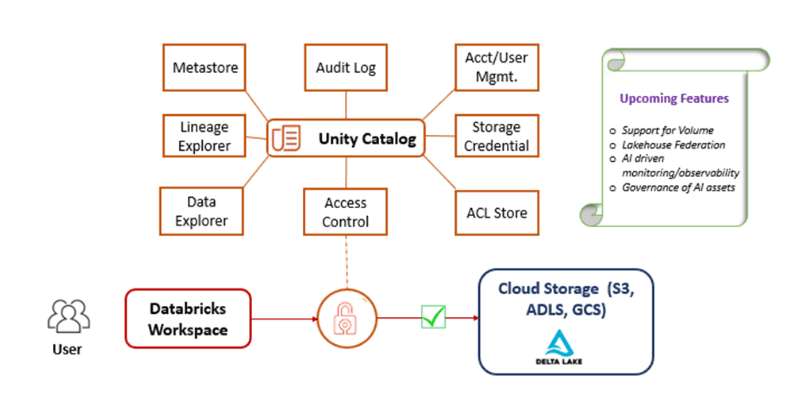Unity Catalog delivers a powerful, flexible way for enterprises to manage data. By centralizing integration, governance, and security, it streamlines analytics and data access while improving productivity and decision-making. Explore the standout features and business benefits Unity Catalog can bring to your organization.
Unity Catalog: Efficient Data Management
Unity Catalog is a Databricks service for governing, securing, and orchestrating data across cloud platforms. It enables developers and administrators to manage data centrally and safely, helping optimize development workflows and protect sensitive information.
#1 Key Features
- Centralized data management
Manage all data assets across multiple clouds such as Azure and AWS in one place.
- Security and access control
Apply fine-grained, role-based permissions to ensure safety and regulatory compliance.
- Easy integration
Integrates with existing data platforms so teams can adopt and scale quickly.
- Audit logging
Record access and change history to monitor, investigate, and control data activity.
#2 Business Benefits
- Stronger data protection
Advanced security and governance help safeguard critical information.
- Time savings
Centralized control and clear permissions reduce overhead in managing and coordinating data.
- Easy to extend
Designed for compatibility across platforms and services, making growth and modernization straightforward.
How Unity Catalog Works
Unity Catalog implements a centralized, role-based governance model. Developers and administrators define access by role, ensuring the right people can work with the right data.
- Core building blocks:
- Catalog: The top-level container for an organization’s data assets.
- Schema: Logical groupings of tables and other objects by domain or purpose.
- Table: Structured storage that can be queried by analytics tools and applications.

Introduction to Unity Catalog
Unity Catalog is an end-to-end data governance solution that helps enterprises manage, secure, and optimize data across their environments. It provides a centralized place to control access and track data across diverse storage and analytics platforms.
Highlights:
- Efficient data governance: Simplifies permission management, reducing security risk and supporting compliance.
- Multi-platform integration: Works with Databricks, AWS, Azure, and more to unify data and analytics.
- Lineage and traceability: Tracks access and changes to ensure transparency and protect sensitive information.
Its primary goal is to meet complex enterprise governance needs while enabling analytics and data engineering teams to work more effectively.
Core Capabilities
- Access control
Fine-grained, role-based access policies for users and groups ensure only authorized personnel can view or modify data.
- Change history and auditing
Capture all key actions—adds, updates, deletes—to support audits and operational oversight.
- Rich metadata support
Strong metadata management for discovery, classification, and labeling, accelerating search and reuse of trusted datasets.
- Broad platform integration
Works across Databricks, Azure, AWS, and other systems to manage and use data from many sources.
- Data security
Modern encryption and detailed security policies protect data from leaks and attacks.
Together, these features streamline governance while preserving agility for analytics and operations.
Setting Up Unity Catalog
Steps to implement effectively:
- Create an administrator account
Establish an admin with authority to configure Unity Catalog and define policies. - Configure data domains
Identify data stores, tables, and access boundaries for each domain. - Define security policies
Use roles and groups to enforce least-privilege access aligned to governance requirements. - Connect analytics platforms
Integrate Unity Catalog with Databricks, Azure, AWS, and other services to synchronize and govern data consistently. - Validate and test
Verify configuration, run security checks, and test permissions to ensure integrity and safety.
A solid setup accelerates analytics while maintaining strong controls.

Real-World Applications
- Centralized data control
Manage multi-source, multi-cloud data in one governed platform for easier access and analysis.
- Regulatory compliance
Financial and healthcare organizations can enforce access controls and auditing to meet standards such as GDPR or HIPAA.
- Cross-platform analytics
Connect to Databricks, AWS, and Azure to gain a holistic view across diverse data sources.
- Data security
Encryption and activity tracking reduce leakage risk and strengthen incident response.
- Operational efficiency
Strong metadata and flexible policy management cut overhead and speed up data workflows.
Common Challenges and Remedies
- Access policy complexity
Clearly define roles and object ownership; use policy testing tools to validate permissions.
- Data synchronization gaps
Check integrations and connectors between Unity Catalog and platforms like Databricks, AWS, and Azure to ensure accurate, timely sync.
- Slow query performance
Apply query optimization, indexing, and sensible partitioning to handle large or complex datasets.
- API connectivity errors
Validate API keys, versions, and network routes; ensure dependent services are healthy and compatible.
- Metadata management difficulty
Establish a clear metadata model and automate classification and tagging where possible.
The Future of Unity Catalog
Unity Catalog is increasingly central to enterprise data governance and value realization. Ongoing and future trajectories include:
- Smarter metadata
AI-assisted classification and discovery to reduce manual effort and improve findability.
- Deeper integrations
Expanded support for more clouds and ecosystems to simplify multi-cloud and hybrid operations.
- Query performance optimization
Advances in distributed caching and intelligent partitioning for faster analytics at scale.
- Enhanced security
End-to-end encryption options and advanced access models for sensitive workloads.
- Better APIs and UX
More user-friendly interfaces and richer APIs for both technical and non-technical stakeholders.
With these advancements, Unity Catalog is poised to remain a core platform for unlocking the full value of enterprise data while keeping governance strong and simple.

Conclusion: Empower Your Data Teams with Unity Catalog
Unity Catalog is not just another data catalog; it’s a unified governance platform that empowers data teams to turn trusted data into business outcomes. With Databricks Unity Catalog, you can standardize metadata, simplify access control, and trace lineage end-to-end—driving faster, safer, and more informed decision-making.
At CMC Global, we specialize in helping businesses harness Databricks to modernize their data estate. As a Databricks Select Tier Consulting & SI Partner, we deliver end-to-end solutions tailored to your goals—standing up Unity Catalog, automating policies, and embedding AI-powered analytics where they create real value.
Ready to simplify governance and boost productivity? Contact us today to explore how Unity Catalog and Databricks can transform your data strategy.




